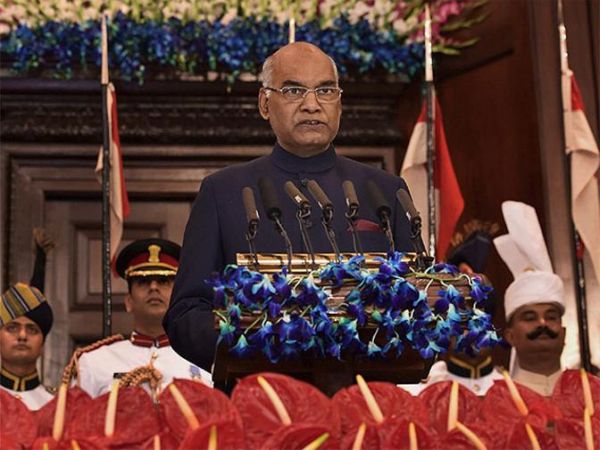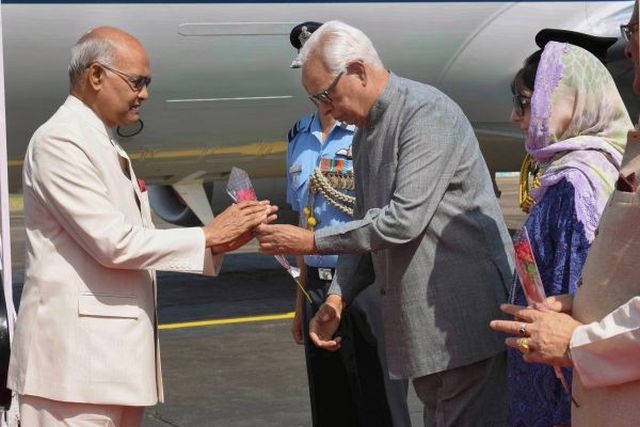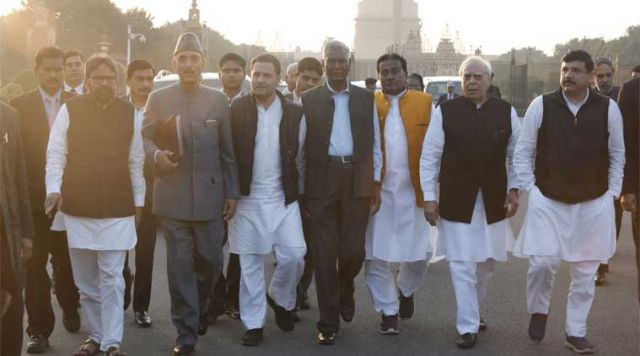
by Editor | May 25, 2021 | Corporate, Corporate finance, Corporate Governance, Economy, Finance, Investing, News, Politics

Ram Nath Kovind
Nicosia : An anti-money laundering memorandum of understanding (MoU) signed between India and Cyprus will help boost investment cross-flows between the two countries, President Ram Nath Kovind said here on Monday.
“We welcome the signing of the MoU between Financial Intelligence Unit, India, and the Unit for Combating Money Laundering of Cyprus,” Kovind said while addressing the media after a bilateral meeting with Cyprus President Nicos Anastasiades.
“This agreement would further strengthen the institutional framework to facilitate investment cross-flows,” he said.
Cyprus is the eighth largest investor in India with a cumulative investment of around $9.2 billion.
“We also emphasised that the revision in the Double Taxation Avoidance Agreement made in 2016 provided greater opportunities for our investment partnership to grow,” Kovind said.
Stating that he and President Anastasiades held detailed discussions on the way forward for bilateral long-standing and excellent relations, Kovind said: “We reviewed our ongoing bilateral and multilateral engagements and discussed issues of regional and global concern.”
Apart from the agreement on combating money laundering, India and Cyprus also signed an agreement on cooperation in the field of environment.
Kovind said that he and Anastasiades called for enhancing business collaboration in the fields of IT and IT-enabled services, tourism, shipping and renewable energy.
The Indian President thanked Anastasiades for his “express support for an early adoption of the India-initiated Comprehensive Convention on International Terrorism (CCIT) at the UN.
“I thanked Cyprus for extending support for India’s permanent membership of the UN Security Council,” Kovind said.
“I also expressed our gratitude to Cyprus for extending continued and strong support to India for its membership of the Nuclear Suppliers Group and help us move on clean energy pathway.”
Kovind arrived here on Sunday on the first leg of his eight-day three-nation tour of Central Europe that will also see him visiting Bulgaria and the Czech Republic.
His visit comes in the wake of Anastasiades’s visit to India in April last year.
—IANS

by Editor | May 25, 2021 | Entrepreneurship, News, Women Entrepreneur
 By Bhavana Akella,
By Bhavana Akella,
Bengaluru : Malvika Iyer was a charming 13-year-old girl in 2002 when a grenade accidentally blew up in her hands, ripping her forearm and paralysing her legs, in Bikaner, Rajasthan, where she lived with her parents. An accident that could have ended her life completely changed her perspective, and even though it took years for her to overcome the trauma, she came out stronger and not only found a way to get her life back on track, but also became a harbinger of change for the disabled.
It was a change in the attitude of others, which came along with the trauma, that sensitised her towards the stigma associated with disability and she chose not to take it lying down, but fight against it not only for herself but for many others like her.
Now 29, the Chennai-based activist has overcome her disability by sheer will and was honoured with the prestigious Nari Shakti Puraskar (Women Power Award) by President Ram Nath Kovind in March this year for pushing the envelope in making everyone understand disability and come to terms with the physically challenged.
Through her talks across countries like the United States, Norway and South Africa as a global motivational speaker, Malvika’s saga has been igniting hope for thousands of people with disabilities the world over.
“I grew up at Bikaner in Rajasthan, where my father was working as an engineer in the state Water Works Department. The incident occurred on May 26, 2002 when I was 13 years old and studying in class IX.
“As I was rummaging in the garage at home, I unknowingly held a grenade in hand that blew up, snapping my forearms and severely injuring my legs, which lay dangling,” recalled Malvika in an interview to IANS.
A fire that broke out in the ordnance depot at Bikaner in January 2002 had flung pieces of ammunition in the vicinity, one of which claimed her arms.
Though bed-ridden for nearly 18 months after multiple surgeries on the legs, which suffered nerve paralysis, and the arms that were fitted with prosthetics, a restless Malvika soon pushed herself to face the challenge of her life at such a young age.
With just four months left for class X exams in 2004, she decided to appear as a private candidate in Chennai for the Tamil Nadu Secondary School Leaving Certificate (SSLC), having missed class IX in 2002-03 after being hospitalised.
The gritty survivor, a bilateral amputee, then took her first steps with her parents’ support and wrote the exams with the help of a scribe as she was still getting used to prosthetics. Her determination had the nation in awe as she passed the board exam with distinction and was among the toppers in the southern state.
“Then President A.P.J. Abdul Kalam read about me in a newspaper and had invited me to Rashtrapati Bhavan. He (Kalam) had asked me about my career plans and spoke to me about missile making,” Malvika fondly recalled.
“Facing board exams with no arms and meeting a President like Kalam made me realise that I should never feel bad about anything lost. There was no looking back after this thought,” asserted the disability rights activist.
Since then, Malvika forged ahead with higher education at the prestigious St. Stephen’s College in Delhi in Economics, a Master’s in Social Work from the Delhi School of Social Work and an M.Phil and Ph.D. in Social Work from the Madras School of Social Work in Chennai, even as she learnt to tackle disability and people’s attitudes towards it head-on.
“I was very active throughout my childhood — good at sports, dancing and had a fun teen life. It wasn’t easy to cope with losing my arms and seeing my legs weakened. But I soon felt that people’s attitude to disabilities hurt more than disability itself,” Malvika quipped.
In 2013, she delivered her first public speech in Chennai, opening up on how the incident changed her life forever. Soon she appealed to many nations across the world, demanding better laws and facilities for the disabled.
Through her talks, Malvika has been highlighting the issues of inclusion, attitudinal change towards the disabled, accessible elections, accessible fashion — where clothing is designed keeping disabilities in mind — body positivity, celebrating people with all body types, etc., while allowing people to connect with her through her own story.
“Every day, I receive hundreds of messages from people across countries, saying that I’ve been a reason why they never gave up in life. It is overwhelming that I’m able to make a difference in people’s lives,” noted Malvika, who also turned a model to advocate accessible fashion.
She is a member of the Chennai hub of Global Shapers Community, an initiative of the World Economic Forum to encourage young people below 30 to work for change, and the United Nations Inter-Agency Network on Youth Development, allowing her to carry her voice across continents.
In March 2017, the United Nations invited her to deliver a speech at its headquarters in New York.
“I was humbled to receive a standing ovation from international delegates when I shared my story,” the gender and disability rights advocate added.
Prime Minister Narendra Modi, who interacted with the Nari Shakti Puraskar awardees in March, described her as an “adbhut naari” (wonder woman), Malvika recollected, stating the award makes her want to work more for women and disabled.
“It is unfortunate that accessibility remains a major issue in our country. There is a need for an attitudinal shift among the people, as discrimination is the main obstacle fro the disabled, making them feel excluded from society,” she pointed out.
Through her Ph.D. research on reasons for stigmatisation of people with disabilities, Malvika urged for a school curriculum that sensitises children from a young age on disabilities.
“I hope I can work with the state-run bodies and educational institutions to introduce a curriculum in schools for the youngsters to understand disability and eliminate pity and stigma,” Malvika said.
(The weekly feature series is part of a positive-journalism project of IANS and the Frank Islam Foundation. Bhavana Akella can be contacted at bhavana.a@ians.in )
—IANS

by Editor | May 25, 2021 | News, Politics
 Panaji : President Ram Nath Kovind on Saturday praised the practice of the Uniform Civil Code in Goa, saying that implementation of the socio-legal system was truly reflective of the values of equality in the Indian Constitution.
Panaji : President Ram Nath Kovind on Saturday praised the practice of the Uniform Civil Code in Goa, saying that implementation of the socio-legal system was truly reflective of the values of equality in the Indian Constitution.
In his address during a civic reception here, he also said that the seaward region’s constant brush with people from different countries across the world, over ages, had earned the natives of Goa the tag of “global citizens”.
“I am happy to know that the government in Goa is laying special stress on empowering women… Goa has a common civil code, as a result of which all residents, men and women, have been given equal rights. This Code reflects the principle of equality in our Constitution and presents a good example to the country,” said Kovind, who is on a two-day visit to the coastal state.
Implementation of the Uniform Civil Code has been a key poll campaign promise of the Bharatiya Janata Party and Goa is the only state in the country, where the Code has been in existence since the pre-Liberation era.
Kovind said that the state’s exposure over time to global influences had a positive impact on the mindset of the local population, making them global in outlook.
“Because of the natural beauty, environment, its coastline, for ages Goa has been attracting people across the world. It has been important centre for international trade in the past. From Japan in the East to Africa and Western Europe, people from various countries have been visiting Goa. The extensive contact with the rest of the world has resulted in an evolved mentality, making Goans global citizens in the truest sense,” he said.
Inviting Goans to visit the Rashtrapati Bhavan, Kovind said that his official residence belonged to each citizen of the country.
“The Rashtrapati Bhavan is a symbol of our democracy and our national heritage. The Rashtrapati Bhavan does not belong to the President alone, but to every citizens of the country. I invite you to visit the Rashtrapati Bhavan. When you are in Delhi, you are welcome to the President’s House,” he said.
—IANS

by Editor | May 25, 2021 | News, Politics

President Ram Nath Kovind being greeted by Jammu and Kashmir Governor NN Vohra on his arrival in Jammu on Wednesday. (PTI)
Jammu : Jammu and Kashmir Governor N.N. Vohra on Wednesday briefed President Ram Nath Kovind about the issues concerning internal and external security in the state.
The President is on a two-day visit to the state.
Vohra is hosting a dinner in honour of the President at the Raj Bhavan, where Kovind will spend the night.
According to an official statement, Vohra briefed Kovind about all the important issues relating to the state.
“Among other matters, Governor briefed the President about the external security situation; obtaining and emerging internal security environment; and status of various important socio-economic development schemes and programmes.
“The Governor also briefed the President on issues relating to the functioning of the administrative apparatus; growing incidence of corruption; impact of social media and enhancing radicalisation,” the statement said.
Challenges facing school education and the health sector also figured in the briefing.
The President attended a civic reception organised in his honour on the Amar Mahal lawns in Jammu city.
Before flying back to New Delhi, the President will visit the Mubarak Mandi heritage site in Jammu city on Thursday.
—IANS

by Editor | May 25, 2021 | News, Politics

(Image: IE)
New Delhi : Leaders of the Congress and 14 other opposition parties on Friday sought President Ram Nath Kovind’s intervention for a Supreme Court-monitored investigation by an independent agency into the “suspicious” death of Judge B.H. Loya.
The leaders also submitted a memorandum to the President, saying that a FIR had not been registered on some earlier statements of Loya’s family members who had talked about him facing “pressure”.
The memorandum was signed by 114 MPs belonging to the Trinamool Congress, Samajwadi Party, NCP, DMK, RJD, CPI-M, CPI, AAP, IUML, Kerala Congress-Mani, RSP, AIDUF, JD-S and JMM, besides the Congress.
They said that Loya’s two alleged “confidants” have also subsequently died in mysterious circumstances.
The opposition leaders said that democracy was in “grave threat” and use of violence by fringe elements of a particular mindset “has spread fear among citizens”.
“Efforts are also afoot to derail investigations and trials in sensitive criminal cases, thereby subverting the cause of justice,” they said.
Congress President Rahul Gandhi told reporters later that several MPs feel that Loya had died in suspicious circumstances and so do the people of the country.
“We all owe it to the Judge and his family and to the system that the investigation should be done independently and effectively,” Gandhi said.
Judge Loya, who was hearing the case of the alleged staged shootout death of Sohrabuddin Sheikh and two others, died in December 2014. Bharatiya Janata Party President Amit Shah was an accused in the case but was later discharged.
The memorandum said the “recent revelations regarding Judge Brijgopal Harkishen Loya’s death require investigation”.
“Loya’s father and sister have revealed that he was being pressurised by none other than the then Chief Justice of Bombay High Court to render a decision in favour of the accused. In return, the deceased Judge was offered Rs 100 crore and a flat or land in Mumbai,” the memorandum said.
“Such statements disclose the commission of a cognisable offence for which lodging of a FIR is mandatory, a procedure consistent with the law as laid down by the Supreme Court. For the Bombay High Court not to have done so is a matter of grave concern,” it added.
The memorandum said that before Judge Loya, Judge J.T. Utpat was the Special CBI Court presiding officer handling the case and he was suddenly transferred despite the apex court’s direction that the assigned Judge will complete proceedings in the case.
It said that lawyer-activist Satish Uke had revealed that two of Judge Loya’s “confidants” had subsequently died in mysterious circumstances.
“Shirkant Khandalkar, a public spirited lawyer in Nagpur, allegedly fell from a high-rise building in the district courts on November 29, 2015, and Prakash Thombre, a retired District Judge, allegedly died on May 16, 2016, after falling from an upper berth in a train.”
“According to Uke, he had spoken to Judge Loya who also told him of the pressure being exerted on him to give a favourable verdict for the accused (in the Sohrabuddin case),” the leaders said, adding that “all this and relevant facts” are in the public domain.
The leaders said that if the lives of Judges and lawyers are jeopardised for doing their duty, then democracy is under grave threat.
“Recently, four most senior Puisne Judges of the Supreme Court also expressed the sentiment that (Indian) democracy is in peril,” they said.
“What is required is a thorough investigation through an SIT of independent officers selected and monitored by the Supreme Court,” the opposition MPs added.
The leaders said that the Central Bureau of Investigation or the National Investigation Agency should not be entrusted with the probe.
“Such a procedure will restore the credibility of institutions in the eyes of the public. We sincerely hope you will use your good offices to serve the cause of justice,” they said.
The leaders accused the BJP-led government of “constant assault on democratic values and traditions” and “wanton misuse of investigating agencies to silence political opponents”.
Asked for the reason for approaching the President while the case is pending in the apex court, Congress leader Kapil Sibal said there is no investigation by the court. “What is going on is a Public Interest Litigation. These matters cannot be decided through a PIL,” he said.
Congress leader Ghulam Nabi Azad said that ahead of Loya’s death in Nagpur, his police security was withdrawn.
“How can the security of a person — a CBI Judge — presiding over such a sensitive case be withdrawn? It creates a lot of suspicion,” he said.
—IANS




